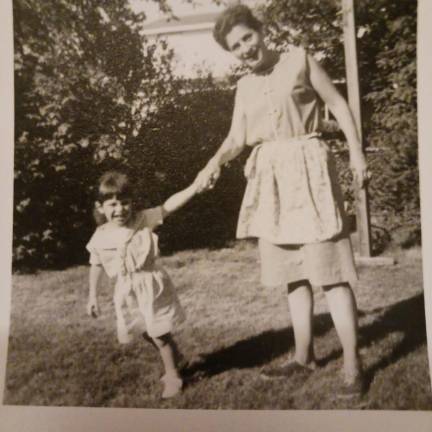Echoes of Googie
A fond farewell to the home that held our family for half a century

Twelve years ago, my grandmother, the woman we all lovingly called Googie, shuffled off this mortal coil at the enviable age of 93, leaving a gaping hole where the center of my family’s universe had been. After she died, her house, the house my siblings and I grew up in and the hub of every gloriously rowdy family gathering for nearly five decades, sat unoccupied and crumbling with burst pipes and collapsing walls, languishing in the nowhere land of foreclosure. That is, until last week, when a real estate developer bought it, burst pipes and all. For us, her remaining descendants, the much anticipated event was met with a bittersweet mix of relief and sadness, the undeniable confirmation that she was, really and truly, gone for good.
I picture the old homestead, knowing that contractors wielding power tools and sledgehammers will soon be descending upon it, tearing down walls and ripping up floors, trashing outdated cabinets, leaky radiators and drafty windows. I imagine the now wildly overgrown backyard, once my grandfather’s thriving vegetable garden and final resting place to a dozen or more long-gone Yorkies and Papillons whose remains nourished the hydrangeas and wild rose bushes he so devotedly tended, all of it now awaiting the backhoe. But there are the other things, the remains that are felt more than seen, the soul of a house that is the combined essences of all its previous inhabitants.
As the inhabitant of a century-old house myself, I can tell you, it has a life of its own. I felt it the first time I grasped one of its turn-of-the-century doorknobs and sensed the lingering presence of farmers heading out to tend fields, wives with baskets in hand off to collect eggs from the henhouse, rambunctious children rushing in hungry and muddy after a day in the woods. I feel it when I sit with my first cup of coffee, light from the rising sun streaming in these old ungovernable windows like it has for a hundred years, taking the chill off the cold morning air. These walls whisper of festive holidays and family gatherings, the nerve-wracking joy of home births, the profound sadness of loved ones lost, tenderly laid out in the front parlor for communal mourning. It’s there in the very soil of this place, the memories conjured when I unearth a rusted horseshoe, a dozen tiny ceramic garden figurines, an old beer bottle, a pocket knife with a wooden handle, a wooden sledge left out to weather the elements for so long it’s become part of the landscape. The rotting barn, barely standing after a hundred harsh winters, keeper of stories and ancient hand-hewn beams, retains small remembrances of everyday life: a penciled inventory of pigs and chickens sketched on the time-ravaged wall; a pair of wooden skis, entombed in spider webs and bird poop, resting in a corner decades after their final foray into snowy fields. Every inch of this place reminds me of who came before, how they lived with struggle and with joy, and the comforting thought that they were ordinary people, just like me.
I wonder, will the folks who come to live in my grandparents’ house detect our joys and failures and hard earned triumphs? I like to believe they will feel the lingering presence of Googie, who was as much a part of that house as the very ground it was built on. She’s there in the garden with her beloved dogs. She’s on the back terrace, tending her jungle of potted flowers, throwing bits of bread over the railing for the songbirds. She’s in the kitchen, cooking up another legendary feast, humming along to Mozart and Bach and extolling the virtues of Abraham Lincoln and the New York Times. Her spirit infused every inch of the old homestead, and I suspect she’ll be there in its new incarnation as well, as comforting as a warm summer breeze. I wish I could tell the new occupants to listen to the house and its well-loved patch of earth, listen with an open heart, and if they should detect a beneficent presence, I would tell them they’re lucky to have her.